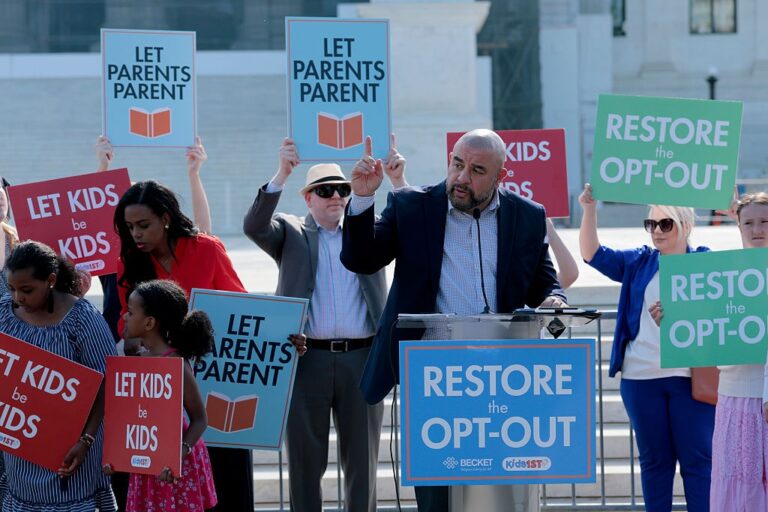Supreme Court Weighs Arguments on Parents’ Rights
Deciding how schools should deal with sensitive matters on human sexuality in the classroom.
By: John Klar | April 28, 2025 | 807 Words

(Photo by Anna Moneymaker/Getty Images)
The US Supreme Court heard arguments on April 22 in Mahmoud v. Taylor. This case asks whether the constitutional rights of parents in Maryland were infringed when they were denied the ability to opt their children out of instruction about gay and transgender themes. The case centers on the religious liberties of Muslims and other faith traditions to be exempt from the indoctrination of children as young as three concerning sensitive matters regarding human sexuality.
Supreme Court Hotspot
The controversy has pitted educators against parents, left against right, and secularists against those of religious belief. How much should schools teach children about moral values, and at what age? Is the dispute about exposure to a broad community of beliefs or about a secular government creating those beliefs in very young minds against devout faith? Given its strong history as a bastion for religious freedom, Maryland is an unexpected location for this conflict to have made its way to the nation’s highest court.
Justice Samuel Alito focused on the impressionable age of the students and their ability to understand what they were being taught critically. “Would you agree that at a certain age, students are capable of understanding this point, which is probably not a point that can be understood by a four- or five-year-old, and that is, that my teacher, who is generally telling me that certain things are right, and certain things are wrong, isn’t necessarily going to be correct on everything,” he asked during the arguments. “It is possible for one to disagree.”
Justice Amy Coney Barrett focused on the legal burden that the petitioning parents were required to demonstrate to overrule the Fourth Circuit’s decision in favor of the schools.
Indoctrination or Education?
The implicit inquiry here was whether the parents had to show that schools were actively coercing their children in conflict with their religious faith or simply exposing them to books or ideas that conflicted with their faith. The parents’ counsel argued the schools were indoctrinating children in moral ideas, not merely using the controversial books to teach how to read, stating, “The Board said when you select these books we want you to select books that will disrupt cisnormativity, [and] disrupt heteronormativity.”
Justice Barrett then focused on this distinction when challenging the legal counsel for the government and read the following excerpt from the teachers’ instructions:
 “When we’re born people make a guess about our gender and label us boy or girl based on our body parts. Sometimes they’re right, sometimes they’re wrong. When someone’s transgender they guessed wrong, and when cisgendered they guessed right.”
“When we’re born people make a guess about our gender and label us boy or girl based on our body parts. Sometimes they’re right, sometimes they’re wrong. When someone’s transgender they guessed wrong, and when cisgendered they guessed right.”
Justice Barrett then inquired of the government attorney whether such questions “seem to be more about influence, and shaping of ideas and less about communicating respect.” In this, she was implicitly joined by Justice Elena Kagan, who asked the petitioners’ counsel directly, “Are your clients objecting to exposure or to indoctrination?” She pressed the petitioners’ attorney to distinguish between reading from the books as part of teaching versus objecting to the books being accessible, concluding:
“OK, so it’s not about exposure, it’s not about books on the shelf, it’s not about books in the library, it’s about actually reading the books with the text that communicates the ideas that are contrary to your clients’ sincerely held religious beliefs.”
Jackson Hints at Her View
In a posture that may hint at her eventual ruling, Justice Ketanji Brown Jackson pressed the counsel about (1) whether there was enough evidence for the courts to rule, and (2) whether parents had any rights when they could simply withdraw their children from school.
In an additional effort to end the case, Justice Jackson questioned whether the plaintiffs were burdened at all since public school is not compulsory:
“But if you have an option to do something else, I guess I’m just worried about suggesting that exposure to things you disagree with in a situation in which you have the option not to expose yourself to that because you can do something else, counts from the standpoint of substantial burden.”
The Supreme Court appears to be leaning toward overturning the lower court decision in favor of the school board, and giving parents the relief they seek. Americans must await the full decision to find out.

- In the case Mahmoud v. Taylor, the Supreme Court will make a ruling on whether parents in Maryland can have their children excluded from classes dealing with gay and transgender issues.
- Plaintiff parents argue they have the religious freedom to opt out of the classes for their kids, just as Muslim parents do.
- Some of the justices on the liberal side argue that public school isn’t the only option, and if parents don’t like the instruction, they can withdraw their children and try something else, instead.
















